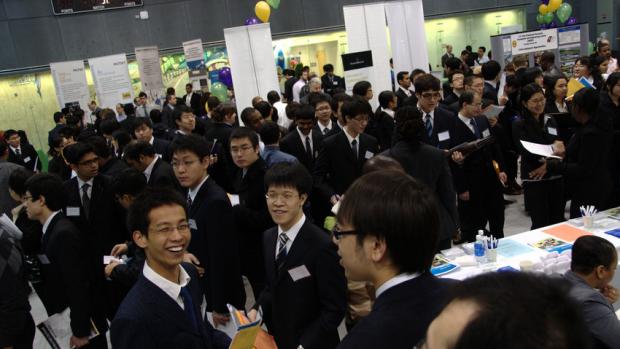Record Numbers Attend Spring Career Fair

On March 3 almost 1,000 Polytechnic Institute of NYU students abandoned their usual garb of jeans and t-shirts for more formal button-down oxfords, dark suits, and heels or shiny wingtips. It was the largest crowd ever to gather for the Institute’s biannual career fair organized by the Career Management Center. For five hours the well-dressed army swarmed the gym, with many hoping to walk away with a coveted internship or job.
“I cut my hair,” said international student and senior Ou Jin, describing her preparation for the event. Stephanie Weldon, a junior and vice president of the student chapter of Engineers Without Borders, prepped along the same lines. “I got an outfit ready, definitely tried to look as nice as possible,” she said.
[GALLERY:3071|left]
Substance overrode style, however, as both discussed more serious preparations: printing resumes and cover letters beforehand, as well as finding out about participating companies ahead of time. “I probably should’ve done a little more,” admitted Weldon, who advised classmates to “go in knowing what you want, what specific field you want in your major.”
Alton Treadwell, on hand for New York’s Department of Transportation, agreed with her. “You want to have thought about your career,” he said. “You want to be able to present yourself.”
Communications that lead to careers
Real-life interactions are, in fact, an advantage career fairs have over other job-seeking strategies. “You can go to LinkedIn and all those other sites — it’s one-way communication,” noted Hasib Iftikihar, a human resources supervisor for UPS Information Services, a company represented at the fair. “This is a two-way dialogue.”
Conversations between jobseekers and employers can lead to important connections: the student chapter of the American Society of Civil Engineers received funding from Jacobs Engineering after one of its members met Vanessa Jimenez at the career fair held last fall. Jimenez, who received a BS in civil engineering from NYU-Poly in 2003 and who now holds a position at Jacobs, remembered how she, as an undergraduate, attended the career fairs, where she secured valuable internships. “You learn more about the company while you’re trying to go into a career,” she said.
This spring it was her turn to steer such discussions, and she offered nothing but encouragement: “When [students] approach me and they’re still sophomores or freshmen, I tell them it might be harder to get an internship as a freshman, but it’s worth trying.”
For Kelly Doyle, a vice president at start-up Prosser Group, younger students impressed him. “These guys are fresh out of high school,” he said, “but they’re hungry enough to go out and look for an opportunity. That shows a lot of initiative.”
Repeat performance
Other employers shared his view, with Treadwell praising repeat attendance at the fairs. “We’ve seen some kids their freshman year — they’re very shy,” he said. “Then we see them a couple of years later and they’ve matured. It’s always good to attend.”
Anyone anxious about visiting such events in the future may be comforted by Weldon’s experience. “I was surprised at how friendly people were,” she said. “I thought it would be more intimidating, but I’m more relaxed than I thought I would be, which is good. It’s not as scary an environment as I thought it would be.”
Sharing the perspective of an employer familiar with reviewing resumes and meeting candidates, Doyle offered simple reassurance. “It’s only a conversation and a piece of paper,” he said.




